-

新人教版高中英语必修3Unit 5 The Value of Money-Reading and Thinking教学设计一
Everybody wants to get wealth.In today’s material world,making money or becoming wealthy symbolizes a person’s success and capability. Many people just make every effort, pay any price to attain greater wealth. With money,they can buy nice, large apartments in nice neighborhood. With money they can own luxurious cars. Wealth seems to bring all happiness in life.But is wealth the only road to happiness? Not really. There are many things in the world, which are beyond the means of money, such as friendship, love, health and knowledge. People are so preoccupied with struggling for money that they have no time or would not take the time to form or maintain friendship. What happiness can they feel living as lonely miserable creatures without love or friends in the world even if they accumulate tremendous wealth?In my opinion, people can’t do anything without money, but money is not everything. What money will bring you depends on your personal belief and goal in life. If you are kind enough to help others, especially the poor, money is a good thing to you. With it, you can do much more for the benefit of people and your country, and it will add to your own happiness. If you want money just for your own needs, you’ll never be satisfied or happy. In a word,you should have money spent for more people. Only then can money be the source of your happiness.Step 8 Homework4 students in a group, one acts Roderick, one Oliver, one servant and the fourth one acts Henry Adams, then listen to the tape, pay more attention to the difference between American English and British English in pronunciation, stress, tone.

新人教版高中英语必修3Unit 5 The Value of Money- Discovering Useful Structure教学设计
Step 3 Meaning1. 过去将来时表示从过去某一时间来看将要发生的动作或存在的状态, 常用在宾语从句中。一般由“would/should +动词原形”构成。She hoped that they would meet again someday. 她希望将来有一天他们能再见面。2. was/were going to+动词原形: 表示过去将要发生或很有可能发生的动作, 常用于口语中, 表示预言、意图或者打算等。He was going to start work the following week. 他打算下星期开始工作。3. was/were about to do: 常用来表示即将发生的动作, “刚要/正要做……”。注意该结构不与任何时间状语连用。I felt that something terrible was about to happen. 我感到某种可怕的事情即将发生。4.was/were to do: 表示“曾计划做某事”, 如果表示“本来计划做某事, 动作没实现”, 则需用 “was/were to have done”。She said she was to have told me about the accident. 她说她本来想告诉我关于事故的事。5.Start, go, come, leave, see, meet等动词的过去进行时: 表示就过去某一时刻而言即将发生的动作。She was coming later. 她随后就来。I had just put on my overcoat and was leaving to visit a friend of mine. 我刚穿上外套要去看我的一个朋友。

新人教版高中英语必修3Unit 5 The Value of Money-Listening &Speaking教学设计
Step 4: Listen again and decide if the following statements are true (T) or false (F).1 It was the first time Chen Liyan's story was reported. T口 F口2 Chen found 10,000 yuan in a small plastic bag in Taiyuan railway station口 F口3 Wang Zheng apologized to Chen because he couldn't offer her more money. T口 F口4 Chen took out a large loan to cure her daughter, T口 F口5 Wang set up a fundraising website for Chen's daughter after Chen told him about her situation. T口 F口Step 5:After listening, discuss the questions.1 What kind of person do you think Chen Liyan is?Chen Liyan is generous and honest because she returned a large sum of money to the owner.2 Did Chen return the money because she didn't need it?No. She returned the money because it was the right thing to do. Evidence for this is that she refused to accept the reward money because she felt that it had not been earned. 3 Is it common for people to do what Chen did?It depends on the culture. In some countries it is quite common to return money that has been found. In other countries, people believe "Finders are keepers!" 4 How did Wang Zheng feel about the return of his money?He must have been very happy and relieved to have gotten his money back. We know this because he thanked Chen repeatedly and even offered her a reward.5 Why did Ma Dongbao tell Wang about Chen's family?He must have had great sympathy for Chen and her daughter and wanted to help them.'We know this because he arranged help for them. 6 How did the news reporter feel about Chen's actions?The news reporter felt that it showed that money wasn't the most important thing in life. We know this because the reporter told us that this is what Chen believes. and then said, “that's a great attitude to take."

新人教版高中英语必修3Unit 5 The value of money-Reading and Thinking教学设计二
? Could you offer me some kind of work here?? I don’t want your charity, I just want an honest job.? Careless: I landed in Britain by accident.Step 7:Consolidation.? Find Henry? Roderick and Oliver were I .making a bet when they saw Henry, a poor young man. ? Know Henry? About a month ago, Henry was sailing and later he found himself carried out to sea by a strong wind. Fortunately, he 2.was spotted by a ship. And it was the ship that brought him to 3.England? Offer money to Henry ? Oliver and Roderick gave Henry a letter and told him that there was money in it. They 4.persuaded him to accept it, and made him 5.promise that it wouldn't be opened until 2 o'clock.Step 8:Language pointsa large amount of: a large quantity of; a great deal ofe.g. They bought a large amount of furniture before they moved their new house.make a bet: make an arrangement to risk money, etc. on an event of which the result is doubtful.e.g. We made a bet on the result of the match.permit sb to do something: allow somebody to do somethinge.g. My mother doesn’t permit me to ride in the street after it rained.by accident: as a result of chancee.g. I only found it by accident.stare at: look at somebody or something with the eyes wide open in a fixed gaze( in astonishment, wonder, fear, etc)to be honest: to tell you the truth; to be franke.g. To be honest, I don’t think we have a chance of winning.Step7 Homework:What do you think will happen to Henry? Will the bank-note help him or get him into trouble?

新人教版高中英语必修3Unit 5 The Value of Money-Reading for Writing教学设计二
2. 您能看到, 我头发太长了。You can see that my hair is much too long.3. 无论什么时候, 只要您想回来就回来。Please come back whenever you want.4. 您仅有很少的头发要理! You only have too little hair to cut !5. 为您服务是我的荣幸!It is my honour to serve you!Step 9 Writing(Henry is walking down the street when he sees a sign for a place that cuts hair. He decides to have it cut. )H=Henry B=BarberH: Good afternoon, I’d like to have my hair cut, if I may. (The barber looks at Henry’s hair and continues cutting another man’s hair. ) Er, I’d really like a haircut. As you can see it’s much too long. B: (in a rude manner) Yes, I can see that. Indeed, I can. H: Fine, well, I’ll have a seat then. (He sits in one of the barber’s chairs. The barber turns to look at Henry. )B: It’s quite expensive here, you know! Are you sure you can afford it?H: Yes. I think so. (After his hair is cut, the barber tells Henry how much he must pay. Henry shows the barber the bank note. )B: Why Mr. . . (looks shocked)H: Adams. Henry Adams. I’m sorry. I don’t have any change. B: Please don’t worry! (wearing a big smile) Nothing to worry about! Nothing at all! Please come back whenever you want, even if you only have too little hair to cut! It will be my honour to serve you!Step 10 Pair workExchange drafts with a partner. Use this checklist to help your partner revise his/her draft.1. Are all the elements of a play included and in good order ?2. Do the character use suitable language ?3. Are the stage directions clear and useful ?4. Is the plot clear and exciting enough ?

新人教版高中英语必修3Unit 5 the value of money-Reading For Writing教学设计一
【参考范文】Narrator:(Henry is smiling as he leaves the restaurant. As he is walking down the street, he sees a sign for a place that cuts hair. He decides to get it cut. )H=Henry;B=Barber;R=rude manH:Good afternoon, I'd like to get a cut, if I may. (The barber looks at Henry's hair and continues cutting another man's hair. )Er, I'd really like a haircut. As you can see it's much too long. B:(in a rude manner) Yes, I can see that. Indeed, I can. H:Fine, well I'll have a seat then. (He sits in one of the barber's chairs. The barber turns to look at Henry. )B:It's quite expensive here, you know!Are you sure you can afford it?H:Yes. I think so. (In comes the rude man. )R:Hey you there. I need a haircut quickly. Can you do me straightaway?B:All right, then, get in the chair and I'll see what I can do. R:Thank you. (sits down in one of the barber's chairs)H:Excuse me, but I was here first. Aren't you going to do my hair first?B:This man's in a hurry. H:Well so am I!I insist that you cut my hair first. B:OK, but I'll have to be quick. This gentleman is waiting. H:Thank you. (They both become quiet. After his hair is cut, the barber tells Henry how much he must pay. Henry shows the barber the bank note. )B:Why, Mr . . . (looks shocked)H:Adams. Henry Adams. I'm sorry, I don't have any change. R:You're that Mr Adams! Well,I'm glad I waited or I might never have known it was you. B:Why, Mr Adams, please don't worry!(wearing a big smile) Nothing to worry about!Nothing at all!Please come back any time, even if you only need too little hairs cut!It will be my honour to serve you!
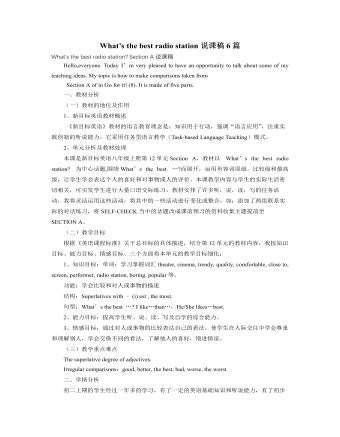
人教版新目标初中英语八年级上册What’s the best radio station说课稿6篇
3、重点和难点:重点:学会用形容词的最高级来对事物或人物进行描述。难点:形容词的最高级加est还是加most.二、 说教法:为了更好的突出重点,突破难点,我主要采用了:1、任务型教学法:新课标倡导的“玩中学,学中玩”的理念很受学生欢迎。例如,阅读文章时,我设计了一张表格,让学生阅读后完成表格并复述。培养学生逻辑分类与表述能力。2、 竞赛教学法:根据初中生争强好胜的性格特征,我每堂课都进行俩俩对话,激发学生兴趣,给学生创造外语语言氛围,培养学生集体荣誉感。三、说学法:1、 善于抓住用英语交际的机会,充分感知,积极体验,大胆实践。例如在导入新课时的One minute dialogue(每组都有一次机会),pairwork (每人都有机会),groupwork(每组一次机会)。2、 积极参与,善于合作。例如本课设计了几个任务,操作简单,学生一定很感兴趣并且积极参与,从而合作完成任务,培养了团队精神。
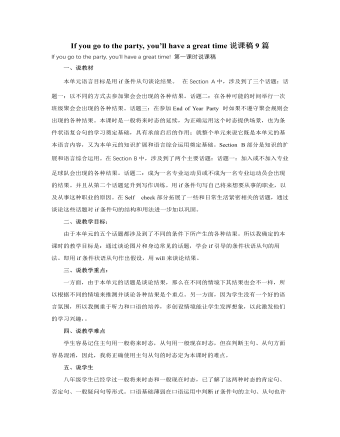
人教版新目标初中英语八年级下册If you go to the party, you’ll have a great time说课稿9篇
二、说教学目标:由于本单元的五个话题都涉及到了不同的条件下所产生的各种结果。所以我确定的本课时的教学目标是:通过谈论图片和身边常见的话题,学会if引导的条件状语从句的用法。即用if条件状语从句作出假设,用will来谈论结果。三、说教学重点:一方面,由于本单元的话题是谈论结果,那么在不同的情境下其结果也会不一样,所以根据不同的情境来推测并谈论各种结果是个重点。另一方面,因为学生没有一个好的语言氛围,所以我侧重于听力和口语的培养,多创设情境能让学生发挥想象,以此激发他们的学习兴趣,。四、说教学难点学生容易记住主句用一般将来时态,从句用一般现在时态,但在判断主句、从句方面容易混淆,因此,我将正确使用主句从句的时态定为本课时的难点。
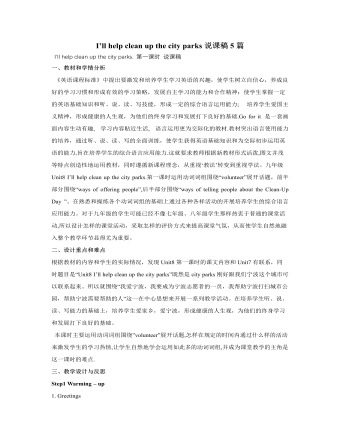
人教版新目标初中英语九年级下册I’ll help clean up the city parks说课稿5篇
二、教法学法1、任务型教学法:每个教学环节都是围绕着如何完成一个教学任务来设计的。2、感悟法:创设语境,让学生在一定的语言环境中感悟语言内涵,从而实现悟中学的目的。只有学生自己悟出的东西才能较好地内化为自己的东西。3、合作点拨法:通过教师创设的学习氛围,设置问题和反思质疑,推动师生,生生间的合作探究,小组合作学习,在解决问题中完成教学目标。以培养他们的合作探究的意识与精神。三、教学程序1 导入新课利用课件中的图片导入:在大屏幕上出示汶川大地震中一些悲惨的图片,让同学们说出汶川,然后老师说as well-know a stong earthquake happened in wenchuan,so many kind people go there to help others.再出示一些军人,医疗工作者,志愿者忙碌的身影,特别是温家宝总理看望受伤的孩子,让同学们知道一方有难,四方支持,帮助困难中的人是很有意义的。然后说Would you like to help others?What would you like to do?
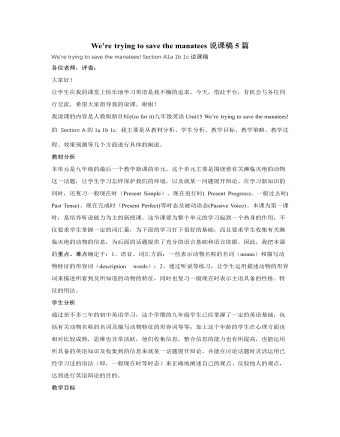
人教版新目标初中英语九年级下册We’re trying to save the manatees说课稿5篇
教材分析本单元是九年级的最后一个教学新课的单元。这个单元主要是围绕着有关濒临灭绝的动物这一话题,让学生学习怎样保护我们的环境,以及就某一问题展开辩论。在学习新知识的同时,还复习一般现在时(Present Simple)、现在进行时( Present Progress)、一般过去时( Past Tense)、现在完成时(Present Perfect)等时态及被动语态(Passive Voice)。本课为第一课时,是培养听说能力为主的新授课。这节课要为整个单元的学习起到一个热身的作用,不仅要求学生掌握一定的词汇量,为下面的学习打下很好的基础,而且要求学生收集有关濒临灭绝的动物的信息,为后面的话题提供了充分的语言基础和语言依据。因此,我把本课的重点、难点确定于:1、语音、词汇方面:一些表示动物名称的名词(nouns)和描写动物特征的形容词(description words);2、通过听说等练习,让学生运用描述动物的形容词来描述所看到及所知道的动物的特征,同时也复习一般现在时表示主语具备的性格、特征的用法。
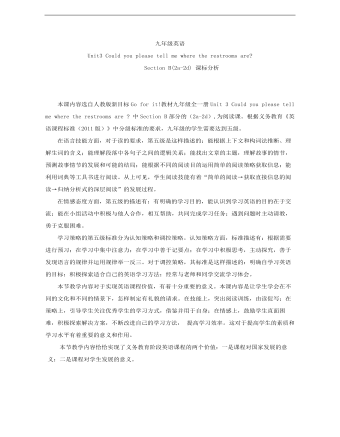
初中英语人教版九年级全册《Unit 3 Could you please tell me where the restrooms are》课标分析说课稿
学习策略的第五级标准分为认知策略和调控策略。认知策略方面,标准描述有:根据需要进行预习;在学习中集中注意力;在学习中善于记要点;在学习中积极思考,主动探究,善于发现语言的规律并运用规律举一反三。对于调控策略,其标准是这样描述的:明确自学习英语的目标;积极探索适合自己的英语学习方法;经常与老师和同学交流学习体会。
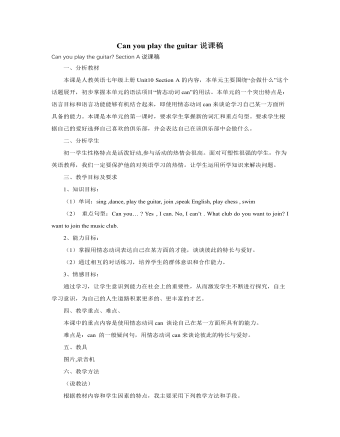
人教版新目标初中英语七年级上册Can you play the guitar说课稿
教材分析1、教材地位作用本单元围绕着学习情态动词can 的用法,来表达自己在某一方面所具有的能力。2、教学目标(知识目标、能力目标)(1)知识目标:复习情态动词can 的用法。(2)能力目标:通过学习can ,达到能灵活谈论自己的喜爱与特长,培养一种群体意识。3、重点和难点:(1)重点:情态动词can的一般问句的用法。(2)难点:利用上下文语境及略读技巧。二、教法:让学生默读课文(限时),让学生在短时内抓住课文的重点,划出关键词,从中亲自感受一下略读的技巧,然后老师加以指导。三、学情与学法针对学生在不理解情态动词can 的一般问句的情形下,反复阅读课文,从而加深对本单元前两页所学can用法的印象,从中真正感悟can的用法.
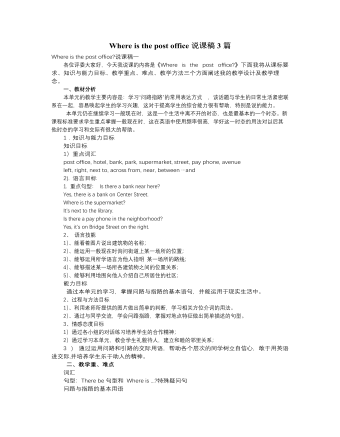
人教版新目标初中英语七年级下册Where is the post office说课稿3篇
Vocabulary:post office, restaurant, bank, supermarket, avenue, pay phone, park, dirty, clean, left, right, next to, across from, near, between, in front of, behindRecycling: hotel, street, new, big, small, busy, Do you want to…?Learning Strategies:Using what you knowDeducingPersonalizingSection ACreate plots and scenes to guide the new lessonThe main content is to learn to ask for and give directions in conversations by introducing some buildings in Section A, so we can adopt the Audiovisual Guiding Method: At first ,review the prepositions that the students have learned, then the teacher can teach some nouns about buildings by showing some pictures or projecting flashcards about some buildings.1. Show a picture of a bank.T:Look at this picture. What place is it ?S:It is a bank.T:Spell it.S: B-A-N-K .Teach other new words : post office, park, supermarket, payphone, street, .Show a map and let students practice in pairs.Is there …… ?Yes, there is. /No, there isn’t.2. Consolidation: Tell us the way to your school.T: Where is the …?S: It’s ….Teach the prepositionsNext to,across from,near,between,in front of,behind.Step1: .Learn some nouns about buildings first, and then the teacher communicates with the students.
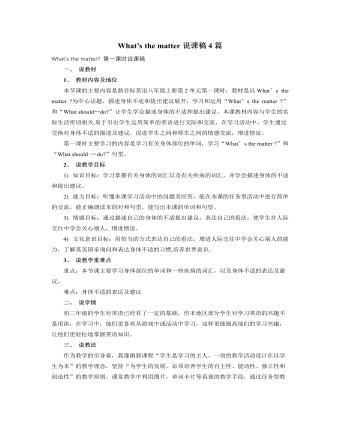
人教版新目标初中英语八年级上册What’s the matter说课稿4篇
在任务环活动中,我通过设计不同的四个任务,让学生在小组中交流、合作、竞争,每个任务都存在着一定的“信息差”,易于激发学生的表达欲望和急于知道最终结果的心情,在活动中他们一定会努力表现自己,做到最好。四个任务所侧重的训练学生的语言能力的要求也各有不同,他们分别侧重训练学生的听、说、读、写的能力。把任务活动放在小组中进行,还可以解决“大班”难于操练的难题,学生在小组中有更多的时间来运用英语表达自己的思想。Post-task任务后活动(4”)1. Grammar Focus(2”)Go through the Grammar Focus with the whole class,ask Ss to point out the main points in this period. Then show the use of The Past Tense on the screen, especially the regular and irregular changes of verbs. 2. Language practice(2”)Practise the sentence patterns and the use of the Past Tense, especially the errors which Ss made while carrying out their tasks. Such as Subject-verb agreement or Tense-agreement, etc. For example: were you see any sharks? He go to the beach. 在学生尽情地参与活动后再让学生反思本节课的语法焦点,并进行适当的操练,对学生在任务活动中的语言失误进行纠正,使学生保持学习信心。语法讲解采用动画形式又保持了学生的学习兴趣。

人教版新目标初中英语八年级下册What were you doing when the UFO arrived说课稿10篇
知识目标:a. 掌握新单词:shout; jump down; climb; scaredb. 掌握并会运用句型:—What were you doing at 8o’clock last night?—I was doing my homework.技能目标:a. 能听懂听力材料的内容,并能做出相应的练习。b. 提高学生听和说的能力。二.教法与学法本节课采取了任务型教学法,通过让学生完成不同的任务来完成不同的教学活动。本节课采用了Brainstorming、Pairwork、Groupwork等活动,实现了让学生说的目标。通过补充故事让学生巩固新学的单词,通过小组的活动让学生参与到问题的讨论中,让学生开口说。三.学情分析通过几个学期的学习,学生已经积累了一定的词汇,并熟练掌握了一些句型。本节课的热身部分是给了学生一个问题:What were you doing at 8 o’clock last night? 通过学生本身的活动来引起他们的兴趣,并对前面的内容进行了复习。四.教学重难点a.掌握本节课所学新单词:shout; jump down; climb; scaredb.掌握和巩固本单元的句型和语法(过去进行时)
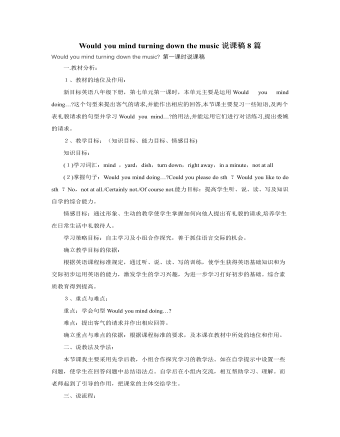
人教版新目标初中英语八年级下册Would you mind turning down the music说课稿8篇
一.教材分析: 1、教材的地位及作用:新目标英语八年级下册,第七单元第一课时,本单元主要是运用Would you mind doing…?这个句型来提出客气的请求,并能作出相应的回答,本节课主要复习一些短语,及两个表礼貌请求的句型并学习Would you mind…?的用法,并能运用它们进行对话练习,提出委婉的请求。2、教学目标:(知识目标、能力目标、情感目标)知识目标:(1)学习词汇:mind ,yard,dish,turn down,right away,in a minute,not at all(2)掌握句子:Would you mind doing…?Could you please do sth ?Would you like to do sth ?No,not at all./Certainly not./Of course not.能力目标:提高学生听、说、读、写及知识自学的综合能力。情感目标:通过形象、生动的教学使学生掌握如何向他人提出有礼貌的请求,培养学生在日常生活中礼貌待人。学习策略目标:自主学习及小组合作探究,善于抓住语言交际的机会。
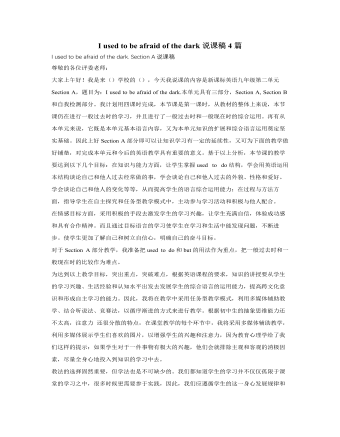
人教版新目标初中英语九年级上册I used to be afraid of the dark说课稿4篇
2、说说写写通过读写训练,进一步学会用 used to 结构来表达自己和同伴过去害怕,或现在仍旧害怕的事情,并且要把最后的结果书写下来,然后让他们将结果用英语告之其他同学,为学生创造展示才能的机会。这样能使全体同学都积极参与,集中精力认真听。既巩固了本节课的目标语言,又为下一个环节3b的对话打下基础。活动结问题比较容易,英语基础较差的学生也能够独立完成,因此,在检查答案是尽量让这部分学生回答,使他们体验到成功后的喜悦,提高他们学习英语的兴趣。 3.对话练习:让学生两人一组,模仿3a中的对话,根据提供的信息与提示词进行对话练习,目的在于对新学的目标语言进行口头练习与设定情景中的运用。为学生创造展示才能的机会。推荐两至三组的同学到教室前面,就所编的对话进行角色表演。
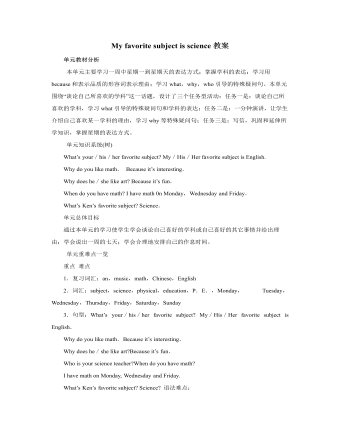
人教版新目标初中英语七年级上册My favorite subject is science教案
本单元主要学习一周中星期一到星期天的表达方式;掌握学科的表达;学习用because和表示品质的形容词表示理由;学习what,why,who引导的特殊疑问句。本单元围绕“谈论自己所喜欢的学科”这一话题,设计了三个任务型活动:任务一是:谈论自己所喜欢的学科,学习what引导的特殊疑问句和学科的表达;任务二是:一分钟演讲,让学生介绍自己喜欢某一学科的理由,学习why等特殊疑问句;任务三是:写信,巩固和延伸所学知识,掌握星期的表达方式。单元知识系统(树)What’s your/his/her favorite subject? My/His/Her favorite subject is English.Why do you like math. Because it’s interesting.Why does he/she like art? Because it’s fun.When do you have math? I have math 0n Monday,Wednesday and Friday.What’s Ken’s favorite subject? Science.单元总体目标通过本单元的学习使学生学会谈论自己喜好的学科或自己喜好的其它事情并给出理由;学会说出一周的七天;学会合理地安排自己的作息时间。
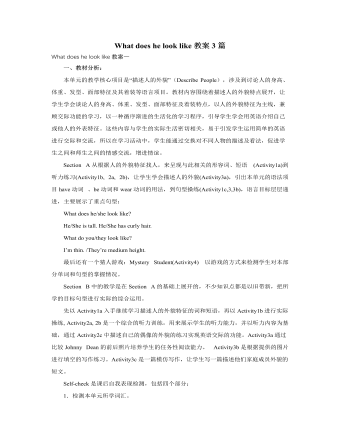
人教版新目标初中英语七年级下册What does he look like教案3篇
所需要用到的句子:Who is that?That is Jack. I like him.Why do you like him?I like him because he is interesting.Task 4: 设计理想中的人类Step one: 设计理想中的人类的外貌。把全班同学分成若干小组,学生可以边说边在纸上画出他们的模样。Step two: 设计理想中人类的性格。学生们可以把那些能描述性格的单词写在图画的旁边。Step three: 每组选出一名同学,其他同组同学提问,他作简单回答,并说明原因。所需用到的句子:What does he or she look like?He or she ...What is he or she like?He or she is ...Why?Because ...Task 5: 挑战性活动调查性格是天生的还是后天形成的,让每个同学回家去调查一下自己成长过程中性格是否有变化,具体是怎样的,为什么会这样? Teaching Aims:1. Enable students to have a general understanding of how to talk about people's physical appearance.2. Enable students to tackle some essential vocabularies and patterns about describing people. Provide them with necessary skills and methods.3. Create various chances for students to describe the persons they're familiar with, such as classmates, family members, teachers, idols, etc.
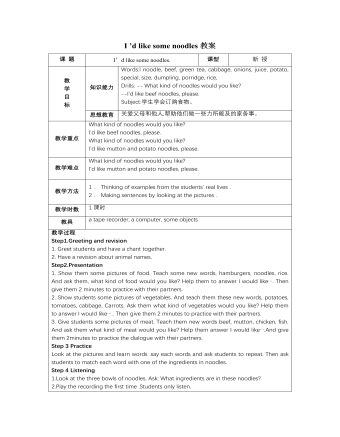
人教版新目标初中英语七年级下册I ’d like some noodles教案
教学过程Step 1: warming-up Sing a song---------“food and drink” Step 2: Revision1 Dictation2 Revise: What kind of noodles would you like?I’d like …What size bowl of noodles would you like?I’d like…Step 3: Presentation1 show pictures of food, ask students say the words.2 Students read the newspaper ad in 3a. Fill in blanks with words in the box. Then read the ad together, the teacher explains some difficult language points.3 Check the answers Step 4 PracticeAsk students to finish 3b in the same way according to 3a. Students read the short passage and fill in the blanks .At last, check the answers.Step 5 productionAsk students to write their own ad for dumplings, noodles, drinks, and other foods they know. Then ask students to read their partner’s ad. Then order food and drink from their partner.Step 6 Home workGroup work – make an ad about “food and drink”